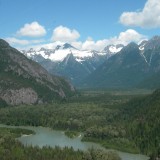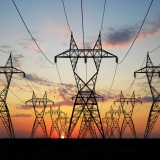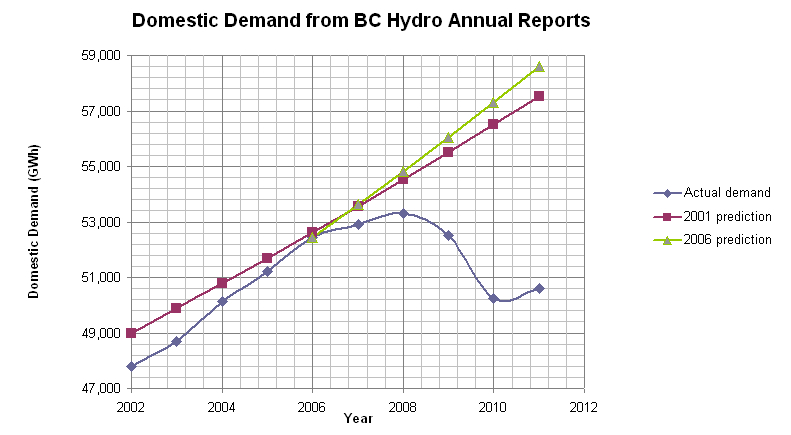Amid the flood of bills the BC Liberals recently pushed through the Legislature in the closing days of the spring session was a quiet amendment to the boundaries of the Great Bear Rainforest – labelled Bill 49. The legislation cleared the way for one of the largest proposed private river power projects in Canadian history, on the Klinaklini River.
Bill 49 reversed then-Liberal Environment Minister Barry Penner’s 2010 decision to reject the redrawing of the conservancy boundary. The recent flip-flop is related to a lawsuit launched in 2010 by project proponent Kleana Power Corporation and its partner, the Da’Naxda’xw First Nation – whose village lies 30 km east of Alert Bay – after their project was waylaid. But did the Liberal Government need to go so far as accommodating the project by changing their own law?
The Klinaklini River, which flows west from the Chilcotin plateau into Knight Inlet on the north end of the Sunshine Coast, is the proposed site of a private river power project of unprecedented proportions. With estimates ranging from 550 to 800 Megawatts (MW) of peak energy production, it would see the mighty river diverted for 17 km through a 10 meter wide tunnel and involve a 10 to 30 meter high dam (euphemistically referred to as a “weir” and “head pond” by the project’s proponents). The dam would flood part of the conservancy; transmission lines and other components of the project would also encroach on the protected lands.
Only Alterra Power’s proposed 17-river Bute Inlet project would cumulatively surpass Kleana Power’s $2.5 billion project in scale. The Kilanklini project even approaches the scale of Site C – a conventional dam proposed for the Peace River – with its 1,100 MW capacity.
The Official Opposition came out swinging last week against the Liberals’ “broken promise” to protect the Klinaklini: “Two years ago we were delighted when the environment minister effectively killed this project by refusing to change the conservancy boundaries,” said North Island MLA Claire Trevena. “So it was extremely disappointing to see the new Liberal environment minister reverse that decision.”
As NDP Deputy Environment Critic Michael Sather asserted to Liberal Environment Minister Terry Lake during the mere 30 minutes of debate allotted by the government for Bill 49, the government has clearly gone well beyond Madam Justice Barbara Fisher’s ruling, which stated it was “not appropriate” for the court to force the government to actually change the conservancy boundary:
…the First Nation asked for the 2010 order that Barry Penner made to be quashed. They got that. They asked for the minister to be directed to recommend to cabinet that the boundaries of the conservancy be changed. They did not get that…Yet Bill 49 changes the boundaries of the conservancy, something the court didn’t grant. Why is the government abandoning its previous attempt to protect the Klinaklini River and going beyond what the judge ordered? (emphasis added)
Sather is correct here – and the reason the court did not order this change to the Great Bear Rainforest boundaries is because courts do not have the power to mandate legislation, only to strike down that which is unconstitutional.
The minister defended the government’s decision, saying, “the court ordered that the Minister of Environment has a legal duty to consult with the First Nation, a proponent in this case, about their request for an amendment — and this is the important part — with a view to considering a reasonable accommodation.” But, as Sather noted, while the judge clearly directed the government properly consult and accommodate the First Nation, she did not go as far as to order it to change the law on the plaintiff’s behalf: “It is rare, however, for the court to become involved in directing a particular form of accommodation…I do not consider this an appropriate case to direct the minister to make the recommendation sought.”
The rekindling of the project is sure to be controversial, as it comes at a highly-charged moment for both private power projects and the Great Bear Rainforest, which has become a focal point for citizens, First Nations and environmental groups battling the proposed Enbridge Northern Gateway pipeline.
Private power projects have been the subject of intense criticism of late, both for revelations of widespread fish kills and weak environmental monitoring and enforcement – slammed by BC’s Auditor General – and for the economics of these deals, discredited by independent economists such as Dr. Marven Shaffer and Erik Andersen.
As The Common Sense Canadian has recently reported, BC Hydro’s new Draft Integrated Resources Plan (p.10) states the crown corporation is still intent on purchasing another 2,000 Gigawatt hours (GWhrs) a year of private power, despite losing hundreds of millions of dollars this year on the deals it already has in place. Yet the proposed Kilnaklini project would likely considerably exceed that 2,000 GWhr total.
That means Hydro’s plan would need to be revised upward to accommodate the project and would leave no room to purchase any other private power contracts – such as the even larger Bute Inlet project proposed by Alterra Power (unless it, say, quadrupled its next “Clean Power Call”). The equally controversial Bute project was also put back on the table last week as the proponent announced a deal with the local Sliammon First Nation to build transmission lines through its territory.
Scott Simpson summarized Kleana Power and the Da’Naxda’xw First Nation’s case in May, 2010, a month after Penner rejected the project:
Da’Naxda’xw First Nation and Kleana Power Corporation allege in a writ of summons filed this week in B.C. Supreme Court that the government failed to honor a 2007 commitment to exclude the project area from the bounds of the Upper Klinaklini conservancy, prior to the settling of the conservancy’s boundaries.
When the conservancy was announced in 2008, the project area was included within its boundaries — contrary to the expectations of the Da’Naxda’xw and Kleana.
The project includes a 10-metre-high weir that would cause water to back up about 5.5 kilometres into the conservancy.
Environment Minister Barry Penner has stated in the legislature that the government will not consider moving park and other protected area boundaries to accommodate electricity projects.
The plaintiffs are seeking a court declaration that would overturn the boundaries of the Upper Klinaklini conservancy, and order the B.C. environment minister to recommend to cabinet an amendment to the conservancy boundary in order to exclude the land and stream bed required to sustain the power project.
In the end, while Madam Justice Fisher’s decision, reached in May of last year, concluded that the nation had not been properly consulted, she stopped far short of telling the government to change the boundary.
The judge’s decision included another interesting conclusion.
Noting that one of the First Nation’s councillors, Fred Glendale, is also a director of Kleana Power Corp., the judge stressed that while the First Nation is entitled to be consulted and accommodated on the conservancy, the company is not: “While it may be obvious, it is important to emphasize that the Crown’s constitutional duty to consult is owed only to a First Nation. In this case, Mr. Glendale is both a councillor of the Da’naxda’xw and a director of Kleana. I have considered his evidence with this in mind, as it is not proper for a corporate entity with First Nation directors (or shareholders) to be the recipient of this constitutional duty.”
As an aside, Fred Glendale is the man who showed up to a 2008 townhall meeting in Campbell River on private power projects – hosted by Save Our Rivers Society and featuring Rafe Mair and myself – in an impressive new pearl-white Cadillac Escalade, before taking his seat next to one Dr. Alexandre Eunall. When Dr. Eunall spoke up against our criticism of the private power industry, Save Our Rivers’ founder Tom Rankin correctly identified him and Mr. Glendale as co-directors of Kleana Power. Dr. Eunall instantly clammed up at that point. Rankin also noted that Eunall has been behind a number of other private power deals where individual First Nations leaders have become personal partners in the corporation created to build the project. Another notable instance involved then-Haisla Chief Councillor Steve Wilson, who also turned up in 2008 as a director of two private power deals near his community of Kitaamat Village, unbeknownst to many of his constituents.
The Da’Naxda’xw First Nation fired back at the NDP this week for its criticism of the project. Spokesperson Dallas Smith told the Campbell River Courier-Islander, “If built, the Kleana project would be one of the most sustainable sources of clean energy in North America.”
By contrast, in a media advisory issued on June 7, Deputy Environment Critic Michael Sather had stated, “The environmental devastation from this project is unthinkable. Five species of wild salmon make the Klinaklini their home. This project would affect them, plus red and blue-listed species and a grizzly bear and moose corridor.” Smith countered, “There will be no net negative impact to eulachon, salmon or grizzly bear by the project…In fact, the project has the potential to deliver a net benefit to fish populations,” (emphais added), though he neglected to elaborate on this surprising contention.
According to the Globe an Mail’s Justine Hunter, reporting in 2010, even the Liberal minister acknowledged the project’s likely environmental impacts: “Kleana’s president said the project could be built with a fraction of the ecological footprint of Site C, but Mr. Penner said it threatened protected wetlands, fish-bearing streams, old-growth forest and grizzly-bear habitat.”
Smith also downplayed the size of the project to 550 MW, though its specs have varied wildly over the years and other private power projects in BC have wound up larger than their proposals initially suggest.
The Da’Naxda’xw may hold title to the territory affected by the project, but they and councillor/Kleana Power corporate director Glendale are asking the people of BC to purchase private power which has been roundly criticized as a sham for the public, driving up hydroelectric bills and contributing to the bankrupting of BC’s most prized crown corporation.
We are presently witnessing the travesty of BC Hydro spilling water (read: power) over its public dams while it’s stuck paying many times the market rate for private “run-of-river” power it doesn’t need. Electricity from our neighbours in Washington State is currently virtually free, as they are in the same situation with their dams (as of this publication, the price for firm, on-peak electricity on the local Mid-Columbia spot market is about $12 – whereas we’re paying up to ten times that much for IPP power in BC!) And yet, we can’t take advantage of this opportunity because of this sham private power we’ve been forced to buy.
The most important take-away here is that having title to a territory does not in any way give a First Nation or its partner corporation the right to hose the people of BC.
Moreover, with the recent exposure of serious environmental problems associated with these projects (and bear in mind this evidence has come from much smaller operations than the proposed Kilinaklini behemoth); and considering the passion demonstrated by many British Columbians in recent years for protecting the Great Bear Rainforest from other industrial impacts, this project is sure to provoke considerable outrage.
Finally, the BC Liberal Government can’t honestly contend Madam Justice Fisher forced their hand. She gave them a nudge; they took a giant leap towards making another of their precious private power projects a reality. The court did not mandate this or any other legislation – courts don’t have the power to do so. In our democracy that power is reserved for the legislature/parliament. So the Liberals should not be let off the hook for this decision to kowtow to private power interests. They’re only too eager to ignore aboriginal title and rights when First Nations oppose a favoured industrial project – i.e., Enbridge, Fish Lake – but if a nation supports a private power project, they apparently bend over backwards to accommodate it.
Whatever the case, the project’s revival would seem to be short-lived, as the NDP have made their position clear. If the Liberals and the project’s proponents can’t ram through environmental approval and a multi-billion dollar purchase contract for the power from the project by May 2013, future Premier Adrian Dix may well kill it once and for all.








